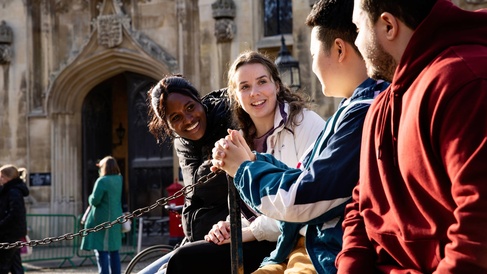Undergraduate

Undergraduate Courses
You can study one of three courses (triposes) in Modern and Medieval Languages and Linguistics.
The Modern and Medieval Languages course at Cambridge is exceptionally flexible and wide-ranging in scope, offering opportunities to study in depth the culture, history, literature, philosophy, art and film relating to the languages we teach, as well as topics in linguistics that explore the specific languages you are learning and the properties which all languages share.
The Modern and Medieval Languages Course | Faculty of Modern and Medieval Languages and Linguistics
Linguistics is the systematic study of human language. Superficially, there’s huge variation among the world’s languages, and linguists not only describe the diverse characteristics of individual languages but also explore properties which all languages share and which offer insight into the human mind. The study of linguistics draws on methods and knowledge from a wide range of disciplines.
The Linguistics Course | Faculty of Modern and Medieval Languages and Linguistics
The History and Modern Languages course provides insight into the cultures of other countries, and understanding of the past and present in international contexts. This exciting four-year Honours degree, offered jointly by the Faculty of Modern and Medieval Languages and Linguistics and the Faculty of History, encompasses intensive study in language, culture, film, as well as a wide variety of British, European and world history. Like other language students, you spend the third year abroad – studying or working in a foreign country, and immersing yourself in the language, culture and history. History courses allow you to develop critical skills in analysis, research, presentation, and writing.
The History and Medieval Languages Course | Faculty of Modern and Medieval Languages and Linguistics
Thinking about studying Linguistics or Modern Languages? These are rich, intellectually rewarding fields, through which your degree course may chart one of many diverse routes, all fostering skills that are highly sought-after by top employers.
The University of Cambridge has ranked first overall in the Complete University Guide for 2024 for both Linguistics and MML Languages. We also rank first for Modern Languages and second for Linguistics in the QS World University Rankings for 2023. We strive to excel across the disciplines we teach and take the needs and outcomes of our students very seriously.
"Know languages, know countries, know people"
Alexander Solzhenitsyn
If you are interested in learning more, join in on one of our Faculty Open Days.
A Modern Languages degree lets you study the world—and lets you get especially close to the cultures and peoples of other places: through the knowledge of their languages. As well as developing your language skills to a high level of fluency, our courses cover a broad spectrum of the culture, history, literature, art, film and philosophy relating to the languages we teach. Within the four-year MML degree you can also study the structure, history and properties of language alongside your study of modern foreign languages and incorporating a year abroad.
Alternatively, the three-year degree in Linguistics lets you explore all aspects of language, our most crucially human attribute. Within the wide-ranging discipline of Linguistics you can explore properties which all languages share and which offer insight into the human mind. The degree in Linguistics does not require detailed knowledge of a particular language, and so the course is accessible to those who have a general interest in and knowledge of language.
Cambridge is a vibrant and challenging place to study Modern Languages and Linguistics. Our world-renowned scholars and researchers are dedicated to teaching and inspiring undergraduates, and our degrees give you the flexibility to follow your interests and discover new ones. No matter what your background, the teaching at Cambridge will develop your knowledge and skills, enhance your analytical and creative thinking, introduce you to new subjects and approaches, and equip you to pursue independent research.
The Faculty of Modern and Medieval Languages is committed to finding students with the highest potential, from any educational background.
